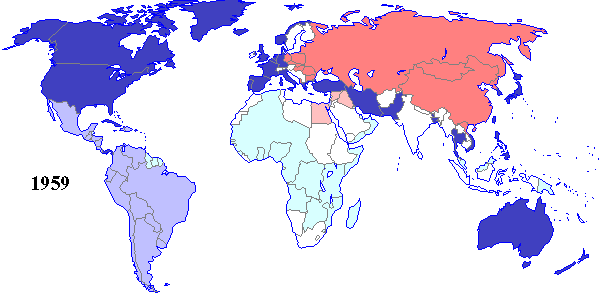


![]()

During the Second World War, the Western democracies had not been entirely comfortable about allying themselves with Stalinist Russia, and it didn't take long for this awkward partnership to fall apart. Over the next few years, the Soviets imposed Communist regimes in its post-war occupation zones in East Europe and North Korea. In China, the end of civil war brought a huge slice of the human population under Communist control, and mass execution of politcal opponents followed. As the 1940s progressed, the West decided to form a system of defensive alliances to prevent any further spread of Communism.
The Organization of American States was founded in 1945 to coordinate the foreign policy of the Western Hemisphere, while all the principle nations of West Europe and North America were joined into the the North Atlantic Treaty Organization (NATO) in 1947. Across the south of Asia, two more American alliance systems, CENTO (Central Treaty Organization) and SEATO (Southeast Asia Treaty Organization), were established to contain possible Soviet expansion southward. By 1959, most of the non-Communist World had promised to be anti-Communist as well.
There were still holes in the pro-American defense perimeter. Many of the recently released Asian nations decided to explore an independent foreign policy instead. Neither Soviet nor Western, they considered themselves a third world which would rather not get dragged into other people's quarrels. Of course, many of the non-alligned nations had their own quarrels to pursue, and they found that the superpowers were happy to support them in order to gain another piece on the chessboard. Thus, with the Americans supporting Israel, the Soviets found that they could gain influence in the region by assisting Israel's Arab neighbors.
Less visible are the internal struggles within the nations on the map. With most of the world's governments declaring themselves pro-Western in the ideological conflict, the Communists readily supported any insurgent movement against those govenments. Whether some of these rebel movements were truly Communist is subject to debate, but in the eyes of the world at the time, the phrase "communist insurgent" was redundant because each word always implied the other.
![]()
Last updated November 1997
Copyright © 1997 Matthew White